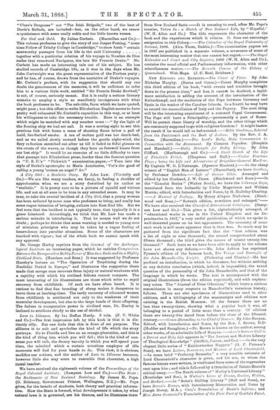NSIV EDITIONS AND REPRINTS.—The Chair of Peter. By John Nicholas
Murphy. (Burns and Oates.)—Count Murphy completes this third edition of his book, "with events and statistics brought down to the present time," and has, it cannot be doubted, a legiti- mate satisfaction in adding the account of the termination of the Kulturkampf, and the mediation of the Pope between Germany and Spain in the matter of the Caroline Islands. In a fourth he may have to record the reconciliation of Italy and the Papacy. The next thing will be the interesting experiment of a restored Papal Government. The Pope will have a Principality,—presumably a part of Rome. Will he permit there liberty of worship, and the other things which are commonly supposed to go with religious freedom ? It might hasten the result if he would tell us beforehand.—Bible Readings, Selected from the Pentateuch and the Book of Joshua. By the Rev. J. A. Cross. (Macmillan.)—The Lord's Body, Holy Communion in Connection with the Atonement. By Clement Poynder. (Simpkin and Marshall.) —Daily Strength for Daily Living. By John Clifford. (Marlborough and Co.)—A Short Sketch of the Life of Friedrich Frilbel. (Chapman and Hall.)—Under Fourteen Flags ; being the Life and Adventures of Brigadier-General MacIver. By Captain W. D. L'Estrange. (Spencer Blackett.)—In the cheap reissue of "English Men of Letters" (Macmillan), we have Southey, by Professor Dowden.—Life of George Eliot. Arranged and edited by her Husband, J. W. Cross. (Blackwood and Sons.)—In the "Camelot Series" (Walter Scott), we have the Volsunga Saga, translated from the Icelandic by Eirikr Magmisson and William Morris ; edited, with Introduction and Notes, by H. Halliday Charting. —A Manual of Zoology. By Henry Alleyne Nicholson. (Black- wood and Sons.)—" Seventh edition, rewritten and enlarged."— We have also received the Classified Educational Catalogue. (Samp- son Low and Co.)—This gives a list, alphabetically arranged, of "educational works in use in the United Kingdom and its De- pendencies in 1887," a very useful publication, of which we spoke in well-deserved praise on its last appearance. The necessity of some such work is still more apparent than it then was. So much may be gathered from the significant fact that the "first edition was a list of eight or nine thousand ; the second comprehended about fifteen thousand ; the third gives the names of nearer twenty-five thousand." Such tests as we have been able to apply to the volume have not shown any defects.—Mr. John Aehton has reprinted Pynsen's edition of the famous book, The Voiage and Travayle of
Sir John Maundeville, Knight. (Pickering and Chatto.)—He has prefixed an introduction, in which he discusses, but without arriving at any definite conclusion (which, indeed, is impossible), the vexed question of the personality of Sir John Mautideville, and that of the language in which he wrote. The text is accompanied with the original illustrations (from the edition reprinted), and with explana- tory notes. The "Journal of Frier Odovicus," which bears a curious resemblance in many respects to Maundeville's veracious history, follows. There are also specimens of illustrations used in other editions, and a bibliography of the manuscripts and editions now existing in the British Museum. Of the former there are no leas than twenty-three, showing what a popular book it was, all belonging to a period of little more than a century. Of editions there are twenty-five dated from before the close of the fifteenth century.—Grace Abounding to the Chief of Sinners. By John Bunyan. Edited, with Introduction and Notes, by the Rev. J. Brown, D.D.
(Hodder and Stoughton.) —Dr. Brown is known as the author, among other works, of an admirable Life of Banyan.—LOW'S Serious Call to
a Devout and Holy Life appears in "The Ancient and Modern Library of Theological Knowledge" (Griffith, Farran, and Co.)—In the very elegant little series of "Knickerbocker Nuggets" (G. P. Patnam's
Sons), we have Letter; Sentences, and Maxims of Lord Chesterfield.
—In some brief "Prefatory Remarks," a very sensible estimate of Lord Chesterfield's character is given, and his son, to whom the famous letters were written, is vindicated from some of the reproaches cast upon him ; and this is followed by a translation of Sainto•Beuve's critical essay.—The March volume of" Morley's Universal Library" (Routledge and Son), is Walton's Lives of Donne, Hooker, Wotton, and Herbert.—In " Bohn's Shilling Library" (Bell and Sons), we have Bacon's Essays, with Introductory Dissertation and Notes by Joseph Davey, M.A. ; Cary's Translation of Dante's Inferno ; and Miss Anna Swanwicles Translation of the First Part of Goethe's Faust.


































 Previous page
Previous page